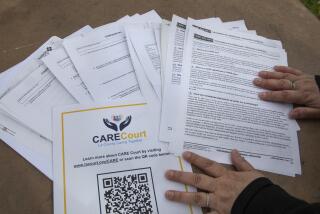How Patients’ Rights Can Harm Treatment
- Share via
The following is a psychiatrist’s bad dream. A patient arrives at the hospital, committed by a court after he was found facing oncoming traffic on a busy road. He has not eaten or slept for days. He is convinced that a conspiracy is taking elaborate shape around him and that he is under attack. He gives his name to the registration lady as Mr. X. The registration lady shakes her head and on the admitting form she copies his real name from the emergency room face sheet. Next to that, she types: “a.k.a. Mr. X.” She has seen this before.
The necessary treatment is evident. Hospital staff need to have background information from those who know him best. Communication between family, outpatient caregivers and the hospital must be free and bi-directional. Mr. X needs to start medication, to stabilize and to be discharged to a setting where his compliance can be monitored. The problem is, without his specific permission, these elements of care violate his patient rights.
Mr. X refuses to sign his Health Care Proxy, so there is no one to make medical decisions for him should he suddenly become too ill to communicate. He also refuses to sign consent forms allowing us to give him any medication. This means we will need to petition the court to force him to take antipsychotic drugs. This process takes weeks, during which he will eat only reluctantly and speak only in fragments.
Noncompliance is standard military protocol, certainly reasonable for a man “under attack.” By holding him in the hospital against his will, we have proved ourselves part of the conspiracy. So it is no surprise--just a soldier’s internal consistency--when he refuses to sign release forms that would let us contact anyone from his past for reliable historical details. He won’t even let us tell his family he is here.
Rights are meant to be protective. During medical training, doctors supported them strongly. We believed in informed consent, confidentiality of communication and treatment refusal. We rejected the grandfather practitioner with his last name stitched in red across one breast pocket (the first name was always “Dr.”), the one who looked over half-glasses and mandated this surgery, that treatment, this medicine. We were tired of a paternalistic medical model, especially in psychiatry, where the sicker the patient the fewer the explanations. We sought collaboration and choice; our patients would be our colleagues.
Psychiatric patients acquired legal rights of informed consent and refusal. They can decide which information to let doctors know, which medication to take and which treatments to refuse. They also can defend their decisions in court.
But because the pendulum is manned by human beings, it has swung too far. In cases like that of Mr. X, patient rights have begun to sabotage treatment. These same rights have lost their hero’s shine and begun to look a little thuggish--riding into town with six-shooters in the name of protection, backing caregivers against the saloon wall, and standing with hands to the holster, ready to draw at the slightest opposing movement.
It is a contorted world when patients who desperately need treatment can refuse doctors access to their medical and psychiatric histories. Doctors’ licenses can be revoked for forcing medications on psychotic patients, no matter how desperately they need them, without court approval (though perhaps if psychotic patients were housed in the court until their cases were heard, the process would move more rapidly). Treatment can devolve into warehousing.
It just so happens, in this particular upside-down case, that we know Mr. X. This is his fourth admission. He consistently stops medication and falls out of view after discharge. Paranoia on a grand level becomes only a matter of time. Probably, the court will let us find out what we need to know about where he has been since we last saw him and treat the life-threatening delusions we need to treat. It has let us do so before--three times.
But we will need to wait until then. And, if for some reason the court rules against us, as it has done in other cases, we are at an impasse. We will be unable to discharge Mr. X because he cannot safely care for himself and unable to treat him fully because his rights have prevented it. It is a bad dream to have and a worse one to enter.
*
Elissa Ely is a psychiatrist at a state hospital in Massachusetts.






